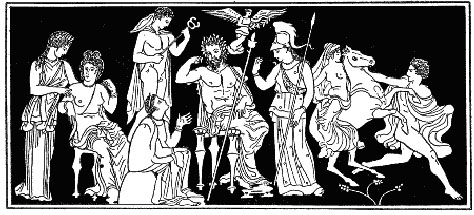

Greek
Myths are all that's left of the ancient Greek religion. About 1200 BC, the
residents of, what we would call, Greece and Asia Minor shared a common belief
in a group of deities that came to be known as The Olympians.
The
distillation of the various regional beliefs into a coherent central religion
was probably not as tidy and uniform as we would prefer, but it's fair say that
the stories of the Olympians survived because they had the largest number of
followers and, most importantly, The Olympians did not forbid or punish the
pursuit of knowledge. Beauty, poetry and creative activities are the blessings
of The Immortals and are a vital part of the Greek tradition.
The
Olympians are descended from the primal, self created gods, beginning with Kaos.
The Olympians are ruled by Zeus. He is the strongest and, as you will see,
without him, the other Olympians would still be held captive inside their
devious father, Kronos.
The
Olympians are only a small part of the family of Immortals that rule the earth
and sky. The various rivers, mountains and forces of nature are the 'bodies' of
the Immortals and proper respect must always be shown if you wish to have peace
at home and safe passage when you travel.
The
ancient texts we call Greek Myths are mostly from the period known as Classical
Greece, circa 500 BC The stories behind the myths are from a much earlier time
but written versions don't exist before Classical times.
The
oldest myths can be traced to three main sources: Homer, Hesiod and The Homeric
Hymns, circa 800 BC That means that by the time they were written down, the
works of Homer, et al, had survived 400 years of additions, subtractions and
mutations to finally become the versions we now call 'authentic'.
Names...
The names are NOT hard to pronounce, don't let them scare you. The Greeks don't
use C's, they use K's instead of C's. For example, Aphrodite is known as Our
Lady of Kypros because the island we call Cyprus is sacred to her. Also,
Heracles (HERA clees) is the famous Greek hero who is often confused with the
Roman hero, Hercules (HER ku lees).... it's important to make the distinctions.
Another
problem that may be encountered is that some of the stories have various
versions. Unfortunately for us it didnít make the research for this book any
easier. We have put together the stories and history of many characters as best
as we could though it can get a little confusing.
The
Greek Myths are our window into the distant past, a view of a world that existed
not only in the mind of the Greek poets but in the hearts of the humble and long
suffering natives of ancient Greece. This journey through time however is a
fascinating one and one worth taking.
You've already taken the first step... I hope you
enjoy the journey.